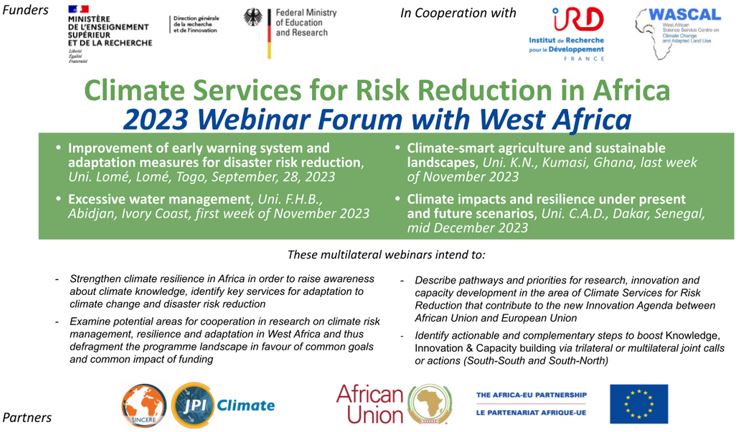1st Webminar on Climate Service for Risk Reduction in Africa: improvement of early warning systems and adaptation measures for disaster risk reduction

ACMAD will contribute to the 1st Climate Services for Risk Redution in Africa Webinar on the title : “Improvement of early warning systems and adaptation measures for disaster risk reduction”
1.Background
Taking advantage of new digital tools for climate-friendly research and innovation, it is proposed to organize a forum through a series of scientific in-depth webinars (mostly virtual or hybrid) associating West-African, German and French representatives along common items using the three complementary angles. Those events could be based within a number of West African Hubs, involving African Universities/ Research Institutes with African Services/Authorities/Funders and potentially also WASCAL Competence Centre and Graduate Schools as locations.
The overall goals are to:
- strengthen climate resilience in Africa in order to raise awareness about climate knowledge, identify key services for adaptation to climate change and disaster risk reduction;
- examine potential areas for cooperation in research on climate risk management, resilience and adaptation in West Africa and thus defragment the programme landscape in favour of common goals and common impact of funding;
- describe pathways and priorities for research, innovation and capacity development in the area of Climate Services for Risk Reduction that contribute to the new Innovation Agenda between African Union and European Union;
- identify actionable and complementary steps to boost KIC via trilateral or multilateral joint calls or actions (South-South and South-North).
2. The 1st Webinar objectives
This first webinar aims to focus on, improvement of early warning system and adaptation measures for disaster risk reduction in the West African region and will be held at WASCAL, in the University of Lomé, Lomé, TOGO on September, 28, 2023. It will cover the following topics:
- Increase knowledge of the hazard;
- Better forecasting it;
- Communicate the forecast;
- Develop adaptation and mitigation measures;
- Post-evaluate any measure in terms of socio-economic value.
- The “value chain” of early warning systems.
- Predictability of rainfall and temperature from weather forecasts to S2S time scales.
- Identify needs, what science can bring and migrate from science to policy advice.
ACMAD will participate in discussion in Parallel Session 1
Topics: Increase knowledge of the hazard; Better forecasting it; Communicate the forecast; Predictability of rainfall and temperature from weather forecasts to S2S time scales. Climate services for disaster risk management
